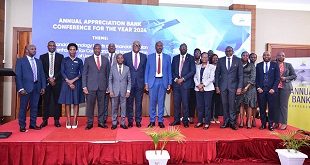
Kampala, Uganda | THE INDEPENDENT | The government has witnessed an increase of nearly 80 percent in local revenue collection from local governments following the transition to online and mobile payment platforms. In 2017, the government started to automate Revenue Management Systems across Local Governments, and one of the systems introduced was named the Integrated Revenue Administration System (IRAS).
The system was designed to assist local governments in budgeting, local revenue collection, accounting, and transparency and efficiency gains in local tax administration and it seems to be paying off according to the Auditor General’s report. “I reviewed the implementation of the two revenue management systems and noted the following observations; As a result of the rollout and use of IRAS, revenue collection has increased from UGX.31.67Bn in FY 2019/2020 to UGX.56.35Bn in FY 2022/2023 an increment of 78 percent,” the report highlights.
According to information obtained from the IRAS website, the Integrated Revenue Administration System (IRAS) has been successfully rolled out in 98 districts, 21 municipalities, and 9 cities. This strategic deployment has required an investment of 20.07 billion Shillings to date, with the system operating seamlessly to achieve noteworthy milestones. In addition to IRAS, another commendable initiative by the Ministry of Local Government is the E-LogRev system, currently operational in 48 local governments.
The Auditor General’s report highlights the positive impact of E-LogRev on local revenue, showcasing a substantial improvement from UGX 21.63 billion in the fiscal year 2019/2020 to UGX 34.17 billion in the fiscal year 2022/2023—an impressive increment of 58 percent. In an interview, Nansana Municipal Mayor Regina Nakazzi Bakitte emphasized the transformative effects of the new revenue system, highlighting its success in eliminating various local revenue leakages.
“Prior to the implementation of the system, revenue was susceptible to exploitation by collectors, politicians, and civil servants. However, the new system has effectively eradicated these loopholes, ensuring a transparent and direct payment process while also curbing the influence of middlemen who previously abused the revenue collection process,” Mayor Bakitte added.
Bakitte pointed out that before the system was introduced, Nansana was collecting 1.5 billion Shillings. However, since the implementation of the new system, they have experienced a significant increase, reaching 9.5 billion shillings. While acknowledging that there might be other contributing factors, she attributes this substantial rise primarily to the new system.
The Mayor further observed that the system has been recognized for its enhanced assessment accuracy. This is attributed to the elimination of assessor discretion and mathematical errors, in addition to assisting taxpayers with record-keeping.
She also adds that the system has a downside, which civil servants are currently exploiting to manipulate revenue. The system includes a catalog of fees to pay and another category named “other revenue,” which lacks a standard fee and is not clearly defined for known taxes. This loophole results in lesser payments being recorded in the system.
Bakitte also recognizes additional challenges that require attention and resolution including the necessity for staff training on system usage and the importance of mobilizing the population to adopt it. The Auditor General also highlighted that local governments lack the necessary equipment to facilitate the utilization of the system. This deficiency is impeding the effective operation of the system.
“I noted that 39 out of the 124 activated local governments had not been availed with sufficient gadgets such as; phones, laptops, printers, and point-of-sale machines, among others, which are useful in operating the revenue system. Similarly, all the users of E-LogRev had also not been availed with sufficient gadgets,” the report added.
Despite an overall increase in local revenue collection, certain local governments have not shown improvement. For example, in the approved budget for the 2021/22 financial year, Masaka City projected a collection of 5.48 billion shillings from various local revenue sources, including trading license fees, billboards, hotel tax, property tax, local service tax, fines, and penalties.
However, it only realized 2.45 billion shillings. In the subsequent financial year 2022/23, Masaka City aimed to collect 5.7 billion shillings but fell short, realizing only 3.74 billion shillings, leaving a shortfall of at least 2 billion shillings.
Addressing the press on the matter, Florence Namayanja, the Masaka City Mayor, emphasized the need to conduct a comprehensive tax valuation roll. This, she believed, can offer a conclusive solution to issues of theft and misappropriation of revenues by staff.
Namayanja added that, alongside the valuation roll, updating the city’s assets and business register is crucial. To her, this step will provide accurate statistics about the local revenue base, simplifying the process of tracking and following up on all payments.
Challenges of Local Revenue Collection Over the Years
Over the years, the government has made persistent efforts to find a practical solution to enhance the revenue collected by local governments, but these endeavors have been unsuccessful.
Despite several policy reforms initiated by the central government to tackle capacity gaps, incompetence, and corruption within local governments, minimal progress has been achieved in addressing the challenge.
Before the Financial Year 2016/2017, Local Government budgets, financed by local revenue, were authorized by the respective Local Governments. Monies collected from local revenues were subsequently utilized from the General Fund Account managed at the district level.
However, various reports brought to light notable leakages in local revenue. One notable example is the absence of realistic assessments of revenue potential for markets in rural Uganda, which alone was reported to result in local districts losing between 25 percent to 74 percent of the total revenues collected to private collectors.
In 2020, the Ministry of Finance issued a directive mandating all local government accounting officers to ensure that all local revenue is remitted back to the Consolidated Fund.
This action, according to several local government leaders like Matia Lwanga Bwaniika of Wakiso, undermined the powers granted to local governments under Article 176 of the Constitution.
The said powers empower Local governments to fulfill functions such as providing medical and education services, managing waste, and undertaking responsibilities related to the construction, maintenance, and rehabilitation of roads, among others, as well as settling their liabilities.
*******
URN
 The Independent Uganda: You get the Truth we Pay the Price
The Independent Uganda: You get the Truth we Pay the Price


